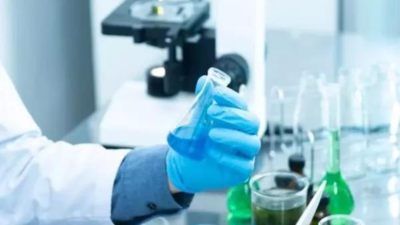India’s CRDMO market has potential to grow to $25 billion by 2025: BCG-IPSO | Hyderabad News

India may hold just a 2-3% share of the $140-145 billion global CRDMO market currently but has the potential to emerge as a global leader at $22-25 billion by 2035, said a report by Boston Consulting Group (BCG) and the newly formed Innovative Pharmaceutical Services Organization (IPSO), an industry body comprising 11 leading CRDMO players.
The report, `Unleashing the Tiger: Indian CRDMO Sector 2025’, said the Indian CRDMO market is growing at a CAGR of 15%, outpacing the global industry fueled by its cost advantage over the West and 90% faster project startup times.
“Global supply chain realignments are unlocking a $10 billion opportunity for Indian CRDMOs, with Western pharma companies looking for alternative hubs. New modalities such as Antibody Drug Conjugates (ADCs) and DNA & RNA therapeutics are witnessing a 25-35% annual growth, providing India with an opportunity to leapfrog in innovation,” the report said, adding that Indian biotech and pharma innovation is accelerating, backed by over Rs 25,000 crore in government funding to foster a self-sufficient, local innovation-driven ecosystem.
According to IPSO and BCG, there are four key tailwinds driving this growth — while the push to de-risk supply chains is making India a preferred outsourcing destination, pricing pressures and policies like the Inflation Reduction Act (IRA) are accelerating offshoring.
Also, the rising demand for advanced modalities like ADCs, gene therapy, and RNA therapeutics is boosting specialized CRDMO services even as growing investments in R&D and infrastructure are strengthening India’s innovation ecosystem, it added.
However, the report points to five key challenges that India’s CRDMO sector needs to overcome to sustain growth. “It needs a 6-7X talent expansion by 2035, faster regulatory approvals and a stronger tier-1 supplier base to reduce import reliance. Limited funding and high capital costs hinder the 4-5X investment needed, while ESG compliance still lags behind Western peers,” it said.
According to the report, with strategic investments, policy interventions, and global partnerships, the sector can drive economic growth, job creation, and global pharmaceutical leadership.
To unlock India’s CRDMO potential, the report also highlighted five key imperatives: accelerating talent development through industry-ready curricula and upskilling initiatives, streamlining policies with a CRDMO-focused regulatory framework, strengthening the supplier ecosystem by incentivizing local manufacturers and establishing innovation parks, expanding capital access by designating CRDMO as a sunrise sector, and enhancing sustainability through green practices and adherence to global ESG benchmarks.
Syngene International Ltd CEO designate Peter Bains said the industry will need to work closely with the government to foster a more competitive regulatory and financial ecosystem in India to compete with other geographies. It will also have to work with India’s academic ecosystem to ensure a strong flow of highly talented scientists, engineers and technology leaders to ensure the industry is capability competitive, he added.
Manni Kantipudi, CEO & whole-time director, Aragen Life Sciences Ltd, said India’s CRDMO sector has all the right ingredients to scale from the current $3-3.5 billion market to $22-25 billion by 2035. “The shift in global pharma outsourcing, the rapid rise of biologics, and India’s expertise in chemistry and process innovation create a once-in-a-generation opportunity. However, to compete at a global level, Indian CRDMOs must not only scale capabilities in new modalities like ADCs, cell & gene therapies, and RNA therapeutics but also work together to build a resilient supply chain and streamline regulatory pathways,” he added.
Pointing out that the Indian CRDMO sector is at the beginning of its `Amritkaal’ thanks to many tailwinds, BCG managing director & partner Vikash Agarwalla said: “India’s inherent strengths—small molecule expertise, cost competitiveness, and a rapidly growing innovation ecosystem—provide the springboard to becoming a dominant player in the global CRDMO market. However, unlocking this full potential will require collective push from both industry and policymakers.”
According to Smruthi Suryaprakash, partner, BCG, as the industry moves up the tech curve to biologics, gene therapies, and next-generation modalities, Indian CRDMOs must aggressively expand capabilities in these high-growth areas. “By addressing regulatory bottlenecks, fostering cutting-edge R&D collaborations, and scaling talent development, India can emerge as a leader not just in small molecules but in next gen technologies,” she said.
















